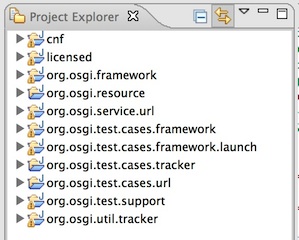git clone git://git.app.eng.bos.redhat.com/org.osgi.tck.git
git checkout r5-core-ri-ct-final
...
HEAD is now at 8ae7389... Updated bnd and changes required to build
Getting the OSGi TCK
There is no public access to the OSGi TCK.
Getting the TCK from RedHat internal Git
We internally host the TCK here
Getting the OSGi TCK form the OSGi Alliance
You need to have an OSGi Alliance member login.
The OSGi Alliance has a page on Installing and Setting up Git
git clone https://www.osgi.org/members/git/build org.osgi.build
git checkout r5-core-ri-ct-final
...
HEAD is now at 8ae7389... Updated bnd and changes required to build
Setup the OSGi TCK
Checkout and build the JBOSGi Framework
git clone git://github.com/jbosgi/jbosgi-framework.git cd jbosgi-framework; git checkout r5 mvn -Pall clean install
Copy and edit the setup properties
cd tcksetup cp ant.properties.example ant.properties vi ant.properties
Running the OSGi TCK against the RI (Equinox)
ant setup.ri ant run-core-tests ant test-reports
Running the OSGi TCK against the JBoss OSGi Framework
ant setup.vi ant run-core-tests ant test-reports
Other target are:
clean Clean the TCK setup run-core-tests Run the TCK core tests setup.ri Setup the TCK using the RI (Equinox) setup.vi Setup the TCK using the Vendor Implemenation test-reports Generate the TCK test reports update-framework Update the JBoss OSGi Framework
Default target: setup.vi
Installing the Eclipse Bnd plugin
There is a mail from BJ Hargrave on bndtools @ OSGi that describes what needs to be done to make the TCK run in Eclipse
Importing the TCK projects
The layout for the core tests is defined in osgi.ct/layout.bnd.
build.core.tests = \
org.osgi.test.cases.framework, \
org.osgi.test.cases.framework.secure, \
org.osgi.test.cases.framework.launch, \
org.osgi.test.cases.framework.launch.secure, \
org.osgi.test.cases.condpermadmin, \
org.osgi.test.cases.permissionadmin, \
org.osgi.test.cases.url, \
org.osgi.test.cases.tracker
Additional to the core test projects, you need to import various other support projects.

Additional to that you would also want to import the projects that you want to test (i.e. framework)
Setup the TCK on Jenkins
The following steps need to be done only once to setup the TCK in the static Jenkins build environment.
[tdiesler@tdmac ~] $ ssh dev85.mw.lab.eng.bos.redhat.com ... [tdiesler@dev85 ~]$ sudo su - hudson [hudson@dev85 ~]$ git clone git://git.app.eng.bos.redhat.com/org.osgi.tck.git static_build_env/org.osgi.tck ... [hudson@dev85 ~]$ cd static_build_env/org.osgi.tck [hudson@dev85 org.osgi.tck]$ git tag r4v42-enterprise-ri-ct-final r4v43-core-ri-ct-final r5-core-ri-ct-final r5-enterprise-ri-ct-final
A Jenkins job can clone the TCK from the static build environment like this
export TCKCHECKOUT=$WORKSPACE/tckcheckout # Clone the TCK repo if [ ! -d $TCKCHECKOUT ]; then git clone /home/hudson/static_build_env/org.osgi.tck $TCKCHECKOUT fi # Switch to known tckcheckout tag cd $TCKCHECKOUT; git checkout r5-core-ri-ct-final
For an example, see the osgi.core.r5v50 job.
Good Luck